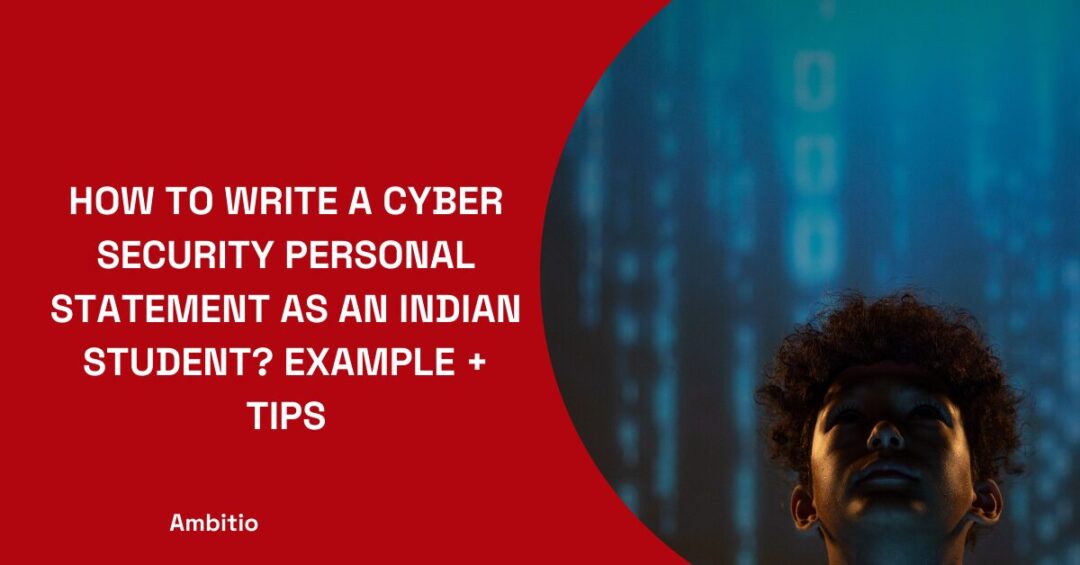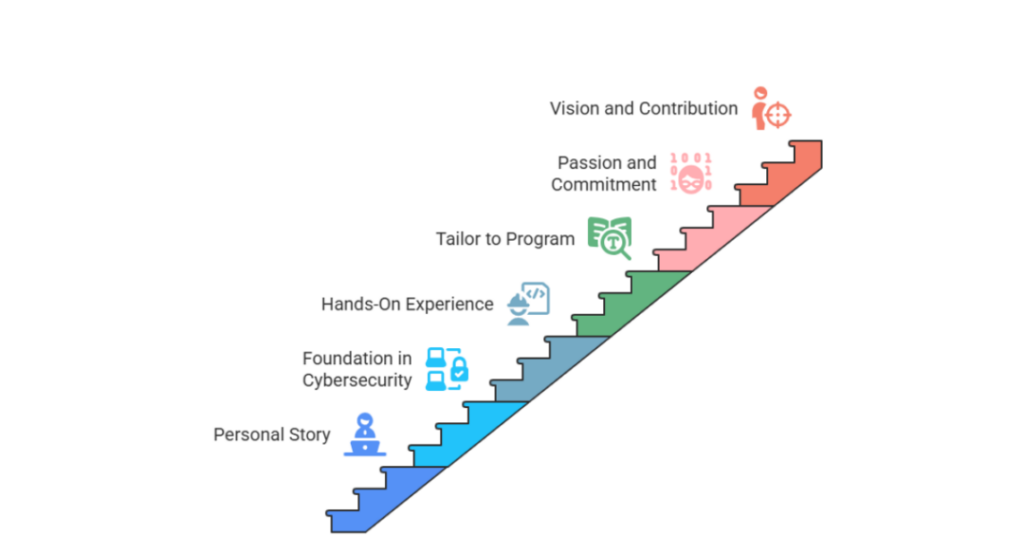19 May 2025
8 minutes read
How To Write A Cyber Security Personal Statement As An Indian Student? Example + Tips

Key Takeaways
- A strong cyber security personal statement proves your real-world understanding and passion beyond buzzwords.
- Master’s programs train you in practical skills like ethical hacking and advanced network security to tackle complex cyber threats.
- Avoid generic phrases and jargon; focus on your personal story and relevant experience to stand out.
If your idea of cybersecurity is just avoiding “password123,” you’re already losing. Writing a personal statement for cyber security isn’t about tossing around fancy words like “information security” or “ethical hacking.” It’s about proving you’re not just another keyboard warrior but a real security professional who gets how brutal the fight against breaches is—and how to win it. This isn’t fluff. This is how to write a personal statement that actually gets you noticed.
Why Should You Pursue Masters In Computer Science And Cybersecurity?
Sure, you could binge-watch hacker movies and pretend you know your way around firewalls. Or, you could actually dive deep into mastering the real deal—where network security measures aren’t just buzzwords, but your daily grind. A master’s degree isn’t about fancy titles; it’s about building the muscle to prevent the next big security breach before it wrecks companies—and careers. If you think ethical hacking is just a cool phrase, think again.

Here’s why leveling up with a master’s in computer science and cybersecurity will change how you see—and fight—cyber threats forever.
1. You Learn to Build Bulletproof Network Security Measures
Most security courses skim over real-world applications. A master’s program forces you to design, test, and implement advanced network security measures that can actually withstand targeted attacks—not just generic threats. You’ll understand the architecture behind security systems and why patchwork solutions fail when the stakes are highest.
2. Hands-On Ethical Hacking Isn’t Optional, It’s a Requirement
Ethical hacking isn’t about playing around with cool tools; it’s the frontline skill you’ll sharpen in grad school. You learn to think like a hacker so you can outsmart the bad guys before they cause a security breach. This mindset shift is what separates amateurs from true security pros.
3. Programming Languages Become Your Secret Weapon
Knowing Python or Java isn’t enough anymore. A master’s pushes you to master multiple programming languages used specifically for cybersecurity tasks—automating defenses, writing exploits for testing, and customizing security protocols. This skillset puts you way ahead of the curve.
4. You Understand the Anatomy of a Security Breach
It’s easy to read about breaches in the news. It’s another thing entirely to dissect them, understand the precise failure points, and predict the next move of cybercriminals. Graduate studies dive deep into case studies that sharpen your analytical skills and prepare you to prevent breaches before they happen.
5. You Become a Strategic Security Professional, Not Just a Technician
Cybersecurity isn’t just tech—it’s business risk management, policy-making, and long-term strategy. A master’s degree trains you to communicate complex threats in business terms, design company-wide security frameworks, and make decisions that protect entire organizations from catastrophic breaches.
How To Write A Great Cyber Security Personal Statement?
You need to convey your mindset: how you analyze complex security threats, anticipate weaknesses in systems, and develop creative, real-world solutions—not textbook answers. Admissions want to see that your passion for cybersecurity comes with strategic thinking and grit, that you’ve already wrestled with complex security challenges (maybe through a tough internship or a hands-on project) and came out smarter, sharper, and more ready to contribute as a cybersecurity expert.
Here is what you need to do:
1. Start With Your Personal Story, Not Just Jargon
Your statement for cybersecurity should open with a personal mission statement that ties your interest in cybersecurity to real experiences—whether it’s a security incident you analyzed, a cyber attack you read about that lit a fire under you, or your first hands-on experience in system security. Admissions want to see your commitment to the field, not a list of buzzwords.
2. Show Your Foundation in Cybersecurity, But Go Beyond Basics
Sure, mention your cyber security degree or the program in cyber security you’re applying to, but focus more on your understanding of cybersecurity concepts—like cloud security, cyber forensics, or security information and event management. Highlight any cybersecurity projects or experience in network security where you implemented security measures or tackled complex security challenges.
3. Demonstrate Your Hands-On Experience and Relevant Skills
Don’t just say you have “experience in the field.” Dive into how your role as a security intern or cybersecurity analyst gave you practical exposure to advanced security protocols and tools. Explain how this hands-on experience shaped your approach to designing cybersecurity frameworks or mitigating security threats.
4. Tailor Your Statement to the Cyber Security Program
Generic statements won’t cut it. Research the cyber security program’s focus—whether it’s proactive security, information systems, or security and resilience—and tailor your statement to show how your academic and professional background aligns perfectly. Include a line or two on how this program will deepen your knowledge of cybersecurity and prepare you for your cybersecurity career.
5. Reflect on Your Passion and Commitment to the Field
Passion for the field isn’t about saying “I love cybersecurity.” It’s showing how you’ve pursued cybersecurity certifications, engaged with national cyber initiatives, or taken extra steps to understand complex cybersecurity concepts. Explain how these efforts fuel your dedication to the cybersecurity field and your ambition to work as a cybersecurity professional.
6. Close With Your Vision and Contribution to Cybersecurity
End your personal statement sample by painting a picture of your future in cybersecurity. How will your personal development and cybersecurity journey help you contribute to security solutions, implement robust security measures, and lead in the cybersecurity field? Make it clear that this isn’t just a degree for you—it’s your mission.
6 Things To Avoid Before You Write A Personal Statement For Cybersecurity
More than what you need to do, what matters is what you shouldn’t do—one wrong move can bury your chances before you start. Avoid these common pitfalls to make sure your statement hits the mark and doesn’t get tossed aside.

Here are six things to avoid if you want to stand out for the right reasons.
1. Don’t Lead With Generic Buzzwords
Saying you have a “passion for cybersecurity” or an “interest in the field” means nothing unless you back it up with concrete examples. Admissions officers see these phrases every day, and they get tuned out fast. Instead, focus on telling your unique story that shows why you truly care and how you’ve acted on that passion.
2. Don’t Overload With Technical Jargon
Dropping complex security concepts or security protocols sounds impressive—until it turns your statement into a confusing mess. Your goal is to communicate your skills clearly and confidently, not to prove you know every acronym. Keep the language accessible so your personality and insights shine through.
3. Don’t Ignore Your Personal Story
Your personal statement isn’t just a resume in paragraph form. If you skip your journey—why you started, what motivates you, and how you’ve grown—you miss the chance to connect emotionally. Admissions want to understand the person behind the skills and certificates.
4. Don’t Forget to Tailor It
Sending the same statement to every cybersecurity program is a quick way to get overlooked. Different universities focus on different areas—like cloud security, cyber forensics, or proactive security frameworks. Show you’ve done your homework by highlighting how your goals align with their specific program.
5. Don’t Exaggerate Experience
It’s tempting to stretch your role or inflate your skills to look better, but honesty pays off more. Admissions can spot vague claims, and dishonesty ruins your credibility. Be clear about what you’ve done—whether it’s a security internship, a project, or coursework—and emphasize what you learned.
6. Don’t Neglect Structure and Flow
Even the best content falls flat if it’s all over the place. A disorganized personal statement confuses readers and buries your key points. Use clear paragraphs, logical progression, and a strong opening and closing to make your story easy to follow and memorable.
10 Top Universities To Pursue Masters In Cyber Security
Did you know that by 2028, the global cybersecurity workforce gap is expected to hit 3.5 million unfilled positions? Choosing the right master’s program can give you the skills and credibility to step into this massive demand—and secure a high-paying career.
Here’s a comparison of 10 leading universities where you can pursue a Masters in Cyber Security:
| University | Average Tuition Fees (USD) | Average Salary After Graduation (USD) | Key Admission Requirements |
|---|---|---|---|
| Carnegie Mellon University | $48,000/year | $115,000 | GRE, Statement of Purpose, Letters of Recommendation, Resume |
| Stanford University | $57,000/year | $120,000 | GRE (optional), Personal Statement, Resume, TOEFL/IELTS |
| Massachusetts Institute of Technology (MIT) | $53,000/year | $125,000 | GRE, Statement of Purpose, Academic Transcripts, Recommendations |
| University of California, Berkeley | $45,000/year | $110,000 | GRE, Statement of Purpose, Resume, TOEFL/IELTS |
| University of Oxford | £30,000/year (~$37,000) | $100,000 | GRE not required, Personal Statement, Academic Transcripts |
| ETH Zurich | CHF 1,600/year (~$1,800) | $95,000 | Statement of Purpose, Academic Records, TOEFL |
| University of Maryland, College Park | $35,000/year | $105,000 | GRE (optional), Resume, Statement of Purpose, Recommendations |
| Georgia Institute of Technology | $30,000/year | $100,000 | GRE, Statement of Purpose, Resume, TOEFL/IELTS |
| University of Waterloo | CAD 35,000/year (~$26,000) | $90,000 | Statement of Purpose, Academic Transcripts, Letters of Rec |
| National University of Singapore | SGD 40,000 (~$30,000) | $95,000 | Statement of Purpose, Academic Records, TOEFL, Recommendations |
Cyber Security Personal Statement Example That Works For All
The thing is that most people do not think about – reading an example can help more than getting it written by experts – it shows you how to balance personal story with technical skills, how to highlight your passion for cybersecurity without sounding generic, and how to structure your statement so it flows naturally. A solid example gives you a clear blueprint to craft your own statement that grabs attention and lands interviews.
Here’s an example that has helped more than 1000s of students write their personal statement the right way:
From early on in my computer science studies, I was drawn to the invisible battlefields of cyber security—where a single security breach can disrupt entire organizations. This curiosity quickly became a commitment as I realized the urgent need for skilled professionals who can design and implement robust security measures to protect critical systems.
During my internship as a cybersecurity analyst, I gained hands-on experience in system security and security information event management tools. I worked on projects that involved mitigating vulnerabilities in cloud security environments, which helped me understand the complexity of modern cyber threats and the importance of proactive security frameworks.
My passion for cybersecurity goes beyond technical know-how. I am dedicated to deepening my knowledge of cyber forensics and ethical hacking, aiming to anticipate and neutralize evolving security threats. Pursuing a master’s in cyber security is the natural next step to develop these advanced skills and prepare myself to lead in this fast-evolving field.
I am excited to join a program that balances theory and practical application, enabling me to contribute effective security solutions and help organizations build resilience against cyber attacks. This degree will empower me to transform my passion into real-world impact as a cybersecurity professional.
Conclusion
our undergraduate degree and relevant experience lay the groundwork, but it’s your clear understanding of computer security challenges and your personal drive that make your statement stand out. Remember, this isn’t just a formality—it’s your chance to prove you’re ready to contribute meaningfully to a field that’s constantly evolving and critically important. Keep it real, keep it focused, and let your story speak for itself.
Most applicants struggle to write a perfect personal statement but end up sounding arrogant — but you won’t. At Ambitio, our AI-powered study abroad experts help you craft a powerful, standout statement that gets noticed. No fluff, no clichés—just a compelling story that proves you belong. Schedule a call with Ambitio’s experts.
FAQs
What are the eligibility requirements for a master’s in cyber security abroad?
Most programs require a bachelor’s degree in computer science or a related field, English language proficiency (such as IELTS/TOEFL scores), GRE/GMAT scores, letters of recommendation, and sometimes relevant work experience
How long does it take to complete a master’s in cyber security abroad?
The typical duration is 1–2 years for full-time programs, depending on the country and university
What are the common specializations available in these programs?
Popular specializations include network security, cryptography, ethical hacking, digital forensics, cloud security, data analytics, and risk management
Which countries are popular for pursuing a master’s in cyber security?
Top destinations include the USA, UK, Australia, Canada, Germany, and Switzerland, each offering strong programs and job markets for graduates
What is the typical course structure and content?
Programs usually combine core subjects like network security, cryptography, and security architecture with electives such as ethical hacking, incident response, and business continuity planning
What career opportunities are available after graduation?
Graduates can work as system security consultants, network security engineers, database security administrators, cryptographers, software architects, and more
Are scholarships available for international students?
Yes, many universities and governments offer scholarships such as the CYD Fellowships (Switzerland), Australian Awards Scholarships, and Fulbright Foreign Student Program (USA)

You can study at top universities worldwide!
Get expert tips and tricks to get into top universities with a free expert session.
Book Your Free 30-Minute Session Now! Book a call now




























